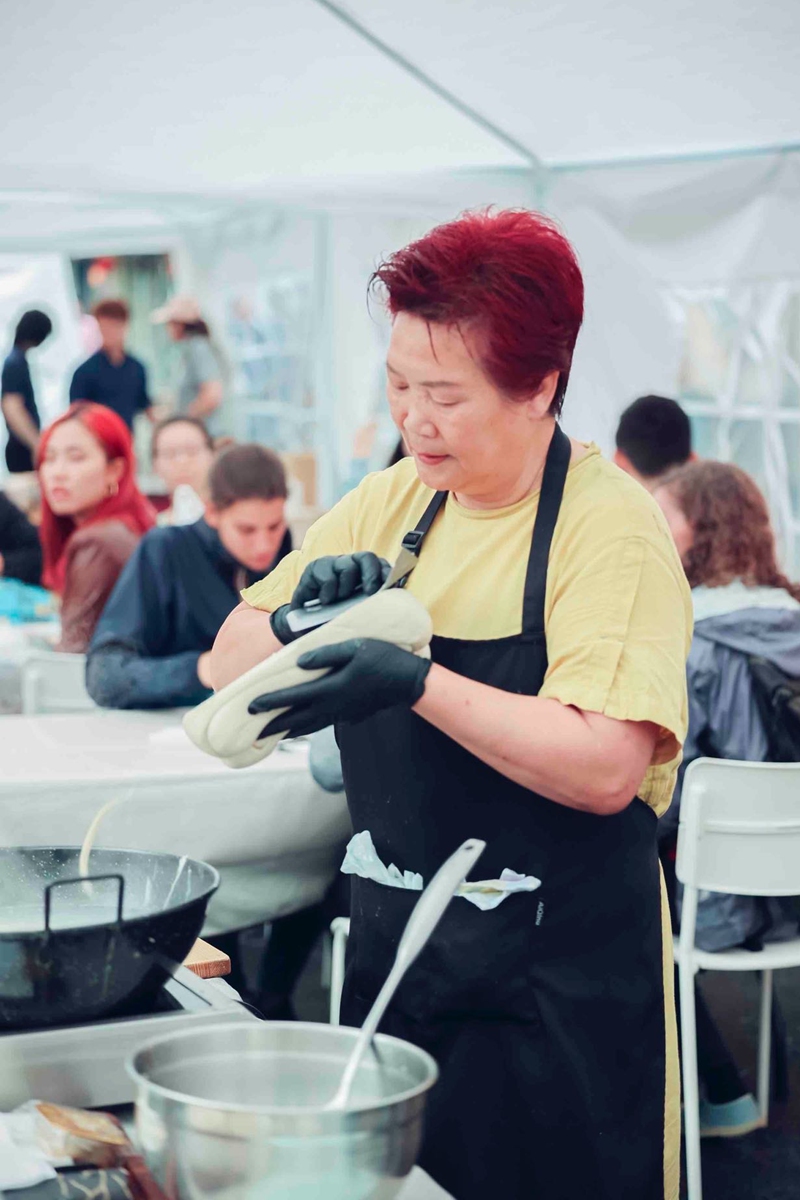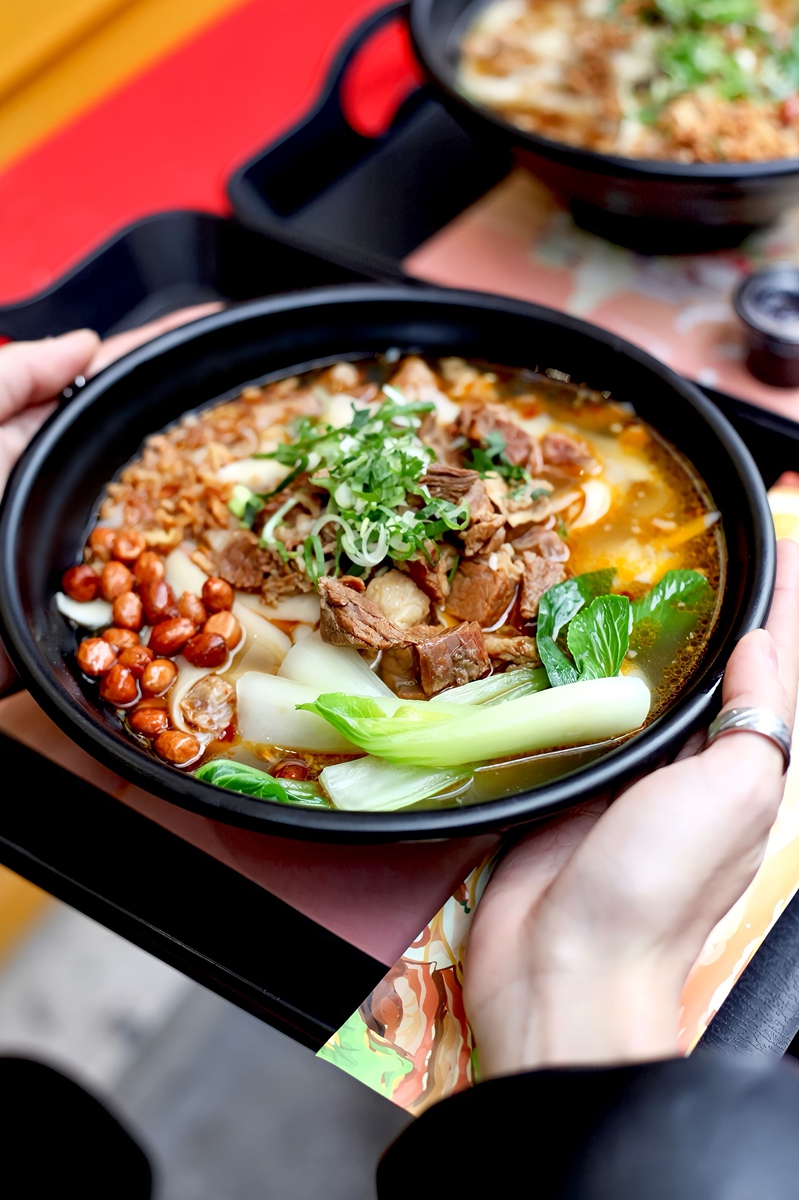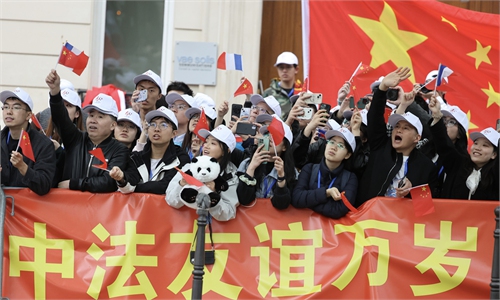ARTS / CULTURE & LEISURE
A cultural bridge spanning continents through noodles
From Shanxi to Paris

A chef makes sliced noodles in one of Guo Zhanglong's restaurants in Paris, France. Photo: Courtesy of Guo Zhanglong
In Paris, where Western cuisine reigns supreme, there is a young Chinese business owner who has opened multiple shops of Daoxiaomian, or sliced noodles, a traditional dish from North China's Shanxi Province.Sliced noodles are made from a base of dough cut entirely by knife, hence their name. The noodles are perfectly thin on the edges and thick in the middle, resembling willow leaves. Highly beloved by noodle enthusiasts, they are one of China's five major delicacies. And now, they are also captivating the locals in Paris.
Guo Zhanglong, 36, uploads videos of Parisians and tourists alike tasting the Chinese noodles and interesting anecdotes about France to Douyin, the Chinese version of TikTok, and video platform Bilibili, garnering over 5 million followers. These videos serve as a window to learning about French culinary culture and other stories about the European country.
"Our videos aren't just recordings of life, but they're bridges for cultural exchanges. Every video shared and every interaction with French friends make Chinese-French cultural exchanges more down-to-earth and realistic, and bring us closer together," Guo said.
'Unique flavor'
Guo came to France as a student in 2011 and has spent 12 years in the country. In 2022, Guo and his family started selling traditional Shanxi sliced noodles at a traditional market in France. At that time, Guo had no intention to turn it into a business venture, but did it simply for fun and video recording.
"2022 was a turning point. When we tried selling traditional Shanxi sliced noodles at a small market in France, our stall quickly went viral online thanks to its unique flavor and authenticity. That year, our story was seen by countless people, and our stall became a small stage for Chinese-French cultural exchanges," Guo told the Global Times.
Through his French friends, Guo learned that soup noodles were not initially a mainstay of French dining habits. Although they existed, they only accounted for a small portion of French food.
At first, Guo and his friends were a bit worried about whether their traditional knife-cut noodles, especially with hot soup, would be palatable to their French friends, considering their taste preferences and unfamiliarity with hot soups.
However, they found their French customers not only could eat it, but also accepted it with gusto.
"We want to bring out the authentic flavors of Chinese cuisine. As my mother used to say, 'What we make has a long history and doesn't need further modification. It has already been perfected. Since it's a classic, its taste will be widely accepted,'" he said.
Some customers said previously they mainly relied on sandwiches and salads for lunch. But after trying soup noodles, they found that having something warm for lunch made their afternoons more enjoyable.
"Nowadays, many French friends around us have added our sliced noodles to their daily diet," Guo said.
"This is our firsthand experience in the understanding that food knows no borders."

Photo: Courtesy of Guo Zhanglong
More than just a restaurant
As the Chinese community grows in Paris, many French people are surrounded by an increasing number of Chinese friends. Through conversations, these French people have discovered many aspects of present-day China that differ from their previous perceptions, leading to more understanding.
Taking advantage of these opportunities, some have traveled to China to witness its current situation firsthand. Upon returning, they eagerly share their insights with their French friends.
Some old customers often bring their French friends to their establishments for meals, taking the opportunity to introduce them to authentic Chinese flavors they have likely never experienced before. Over dinner, they share their perspectives and insights about China, fostering cultural exchanges in an informal setting.
"Sometimes I feel that we have turned my small restaurant into a little gathering site for cultural exchanges between China and France. This is something I didn't expect, but I'm proud that we might have achieved it accidentally," he said.
Guo said it's not something that could be accomplished by his efforts alone. Instead, it is the efforts of all French friends interested in Chinese culture and Chinese friends who love France, and the efforts of every individual that have eventually led to this result.
When he first came to Paris over 10 years ago, Guo could hardly see any Chinese brands, though there were plenty of Chinese products. But 10 years later, there are some Chinese brands of new energy vehicles, mobile phones, computers, and cameras in Paris, something that he is very proud of. Moreover, over the last decade, Paris has seen the opening of many authentic Chinese restaurants.
A French customer told the Global Times that although she doesn't live in Paris, she often visits the city. "I like to visit Chinese restaurants in Paris because, in my city, there are no such restaurants. But here, the food is original and completely different, like the food I have tasted here."
She said her children learned a little Chinese in middle school, and they have also traveled to China.
As Guo said, "We have the feeling that it's actually the continuous exchanges and cooperation between ordinary people of both countries that have slowly accumulated into such friendly relations between the two countries."



